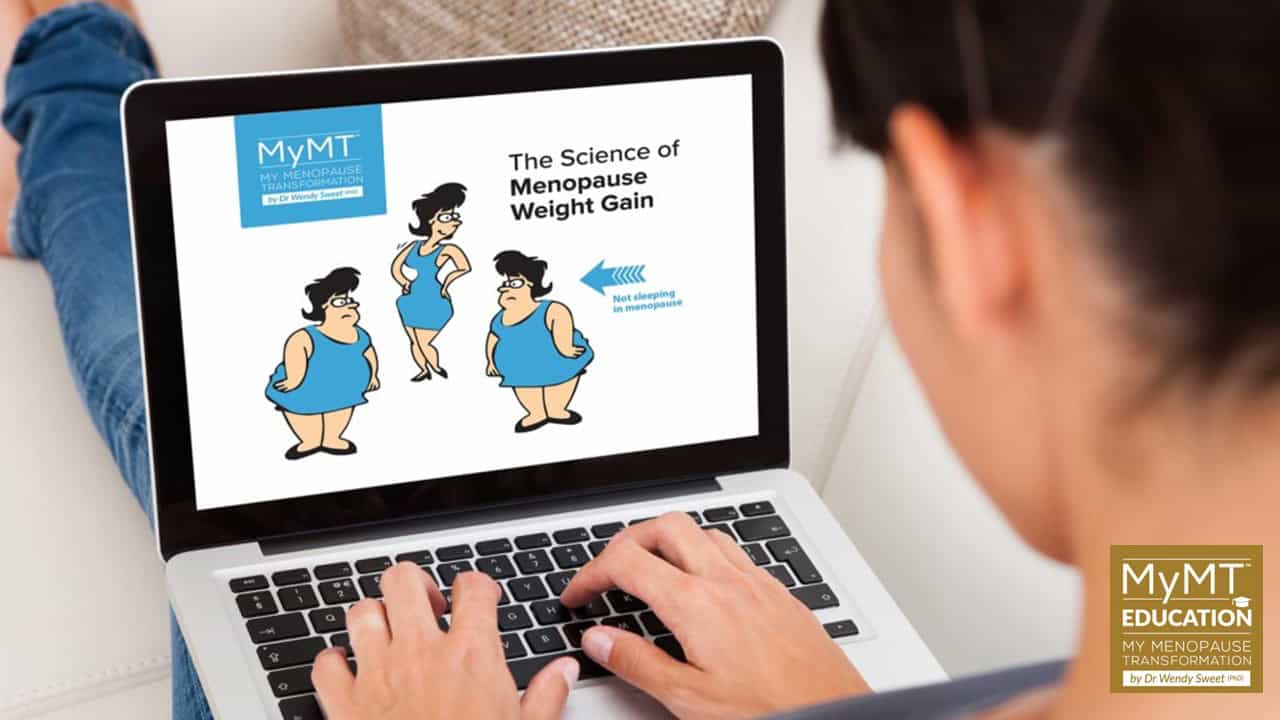Poor sleep, changing liver health, muscle tone and size changes – all of these factors impact a woman’s sleep, thyroid and blood sugar hormones as well as their liver health, contributing to weight gain in menopause.
It’s why, the menopause transition, which is the biological gateway to a woman’s ageing, leaves them vulnerable to other health changes in mid-life.
If your client’s are putting on weight that you are struggling to manage it, then please have a read of the 5 main reasons I attribute to menopause weight gain.
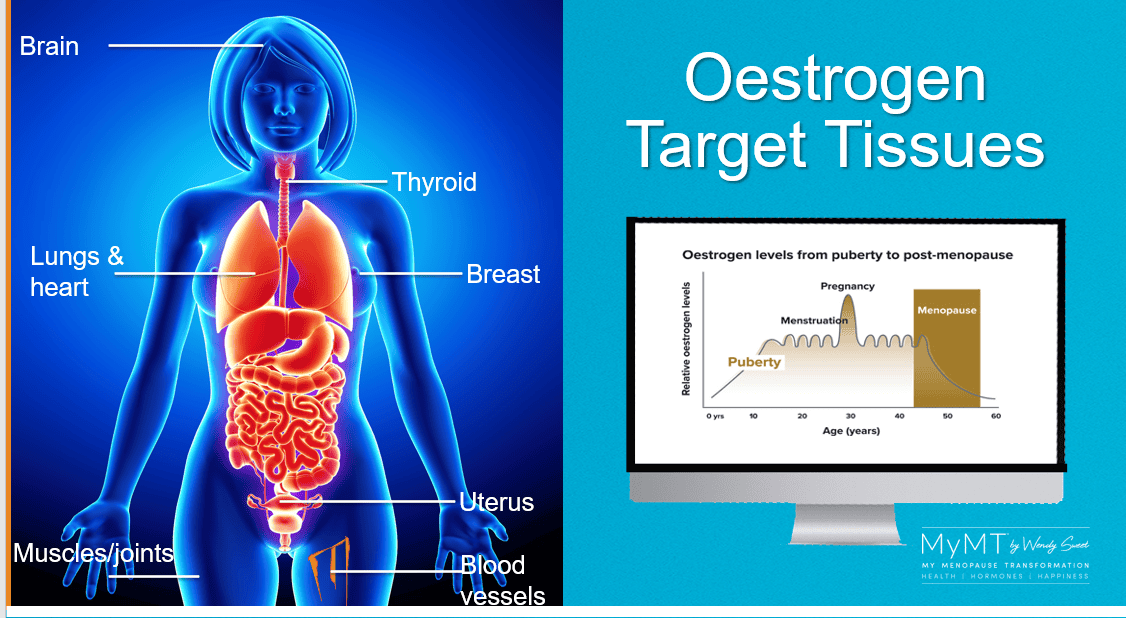
5 Reasons for Menopause (and Post-Menopause) Weight Gain
1. NOT SLEEPING – Incredibly, because of our changing hormone levels in menopause, we can add 1-2 kg a week during menopause when we can’t sleep. Thanks to a Swedish study of 400 middle-aged women who recorded shortened sleep duration and weight gain, this is better known. (Theorell-Haglow et al, 2010)
The problem is, that this is what changes our health as we age – my mother included. When we lose our precious deep sleep between 2-4am, then much of this weight becomes dangerous fat that goes on our belly and under our diaphragm. As I often say to women who are trying to exercise off their weight gain, “If you aren’t sleeping, then you aren’t losing.”
When it comes to reversing weight gain in midlife, a good night’s sleep is the answer instead. I know that’s easier said than done when women are suffering from hot flushes, night sweats, having to get up and pee, or restless legs and joint pain.
But when women are awake night after night, this means that their glucose-carrying hormone called insulin, remains higher than usual overnight. So too, does their stress hormone called cortisol. When this happens, this interferes with both melatonin and another sleep hormone called Adenosine.
As sleep deprivation accumulates, it can increase the risk of heart problems, anxiety and depression; resulting in even more sleepless nights and worsening night sweats. In my courses, I place a great emphasis on understanding exactly what to do to turn around the circadian rhythm and pituitary production of melatonin, that is specific to menopause.
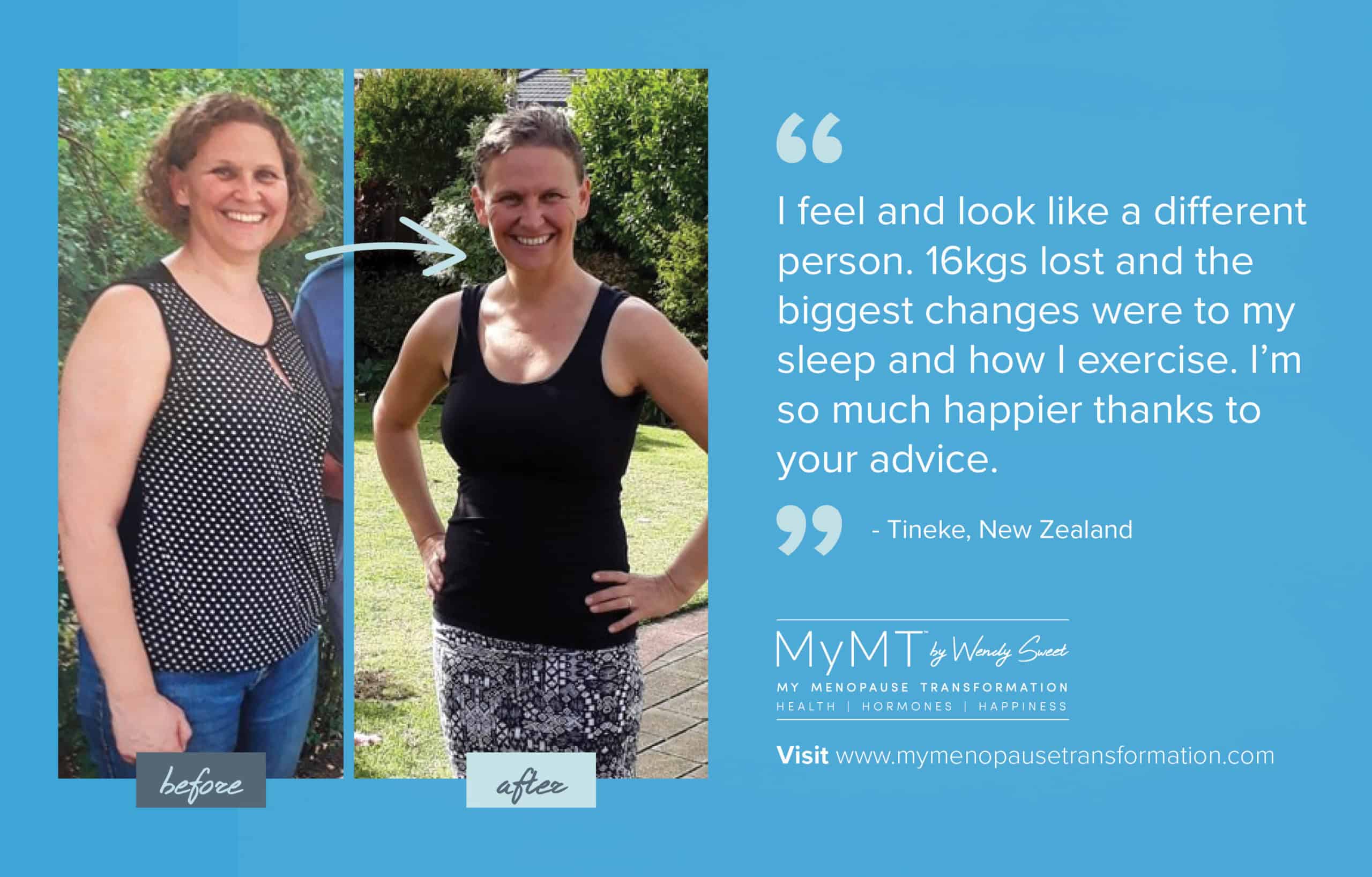
2. OESTROGEN DOMINANCE – Have you heard of this condition? I know that I hadn’t when my weight blew out to an all-time high as I arrived in my late 40’s and early 50’s.
When menopause hormonal changes arrive and women don’t adjust their lifestyle to suit these changes, our fat cells can turn towards storing any excess oestrogen that arrives from our diet and hormone-agents in the environment.
When this happens, there is more oestrogen stored in our fat cells and this ‘dominates’ the internal environment. As oestrogen becomes the dominant hormone and our liver isn’t clearing excess oestrogen efficiently, the role of progesterone changes too.
This is why liver health is important to weight management as well as glucose (blood sugar) regulation. We clear excess oestrogens via our liver and during menopause, our liver changes in structure and function as part of our normal biological ageing of our organs.
3. MUSCLE LOSS – When we begin to lose muscle, our metabolism drops off. Skeletal muscle has the most effect on our metabolism. Muscle loss is highest for women during menopause and the rate accelerates when we aren’t sleeping or we have stopped being physically active because our joints and muscles are sore (I know this all to well myself). Losing muscle means that we don’t ‘burn’ as many calories as we used to either. This muscle loss is normal and is a condition called sarcopenia.
But the effect of this is that we lose mitochondrial cells which are the location for fat-burning and energy production in our body. So, focusing on restoring energy levels, joint function and some aerobic exercise, especially good old fashioned walking is an important part of the MyMT™ Menopause Weight Loss Coach.
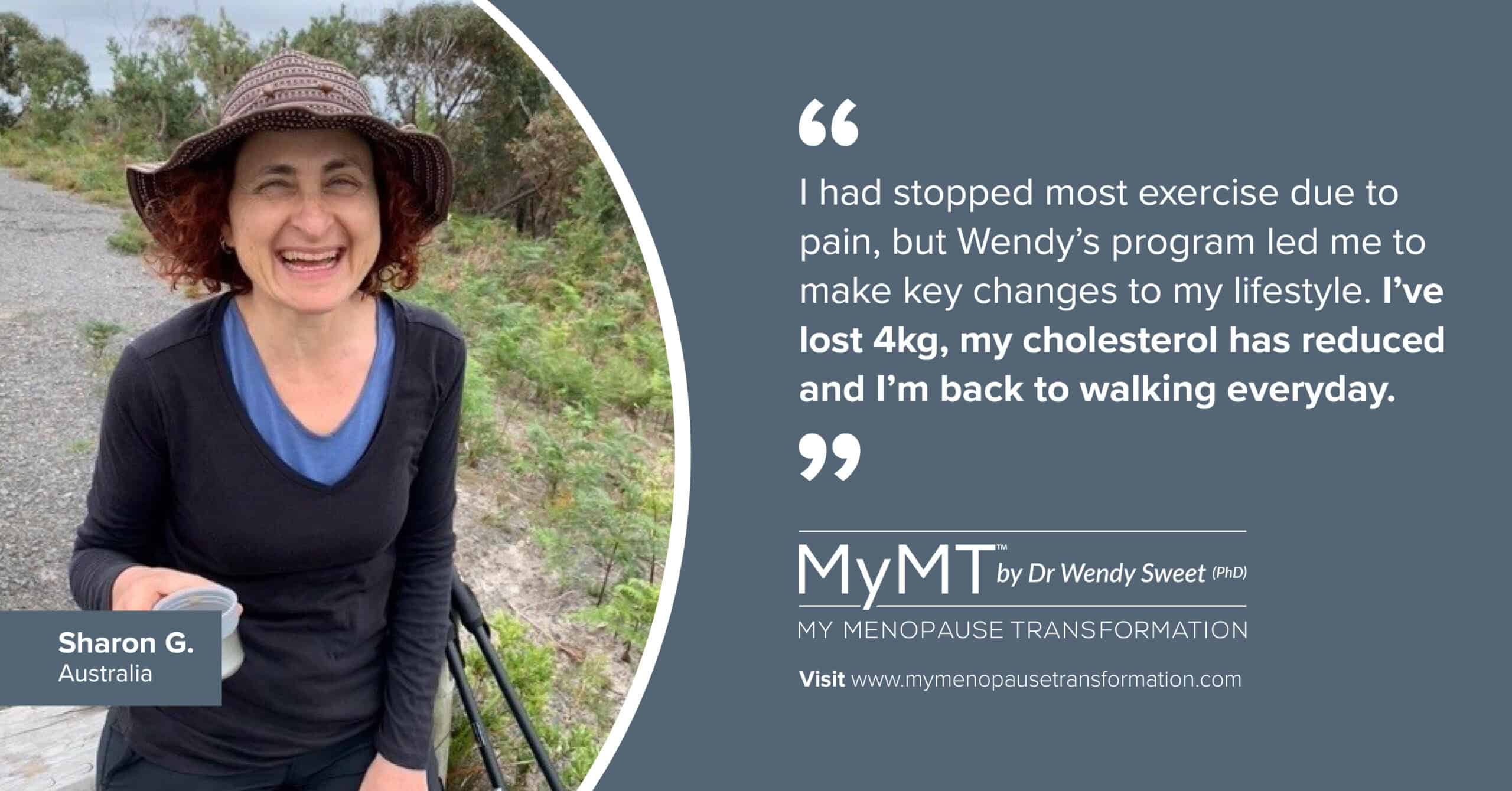
4. LOW VITAMIN D LEVELS – Declining oestrogen levels may cause low Vitamin D levels, which increases fat storage. Our skin is our largest organ and is full of oestrogen receptors. Vitamin D is a fat-soluble vitamin and is produced in the skin with the help of oestrogen.
Therefore, many women are at risk of low vitamin D levels and because Vitamin D is now recognised as a hormone, low levels have an effect on other hormones in the body too. This is due to the feedback system that operates with all of our hormones.
When Vitamin D is low, hot flushes are increased and memory loss/ foggy brain becomes worse. We also experience more muscle soreness because Vitamin D is involved in the production of calcium and our bones and muscles require calcium to help them to remain strong.
Vitamin D is such a powerful hormone for women to monitor in menopause because it is also implicated in melatonin production. This is our sleep hormone, and when Vitamin D levels are low, our insomnia increases and our mood hormone, serotonin, is reduced.
Serotonin works with dopamine to help our mood and motivation. So, if your clients are on menopause-related anti-depressants, then they should be asking their Doctor to also check their Vitamin D levels too. Restoring Vitamin D and sleep is crucial to health and weight.
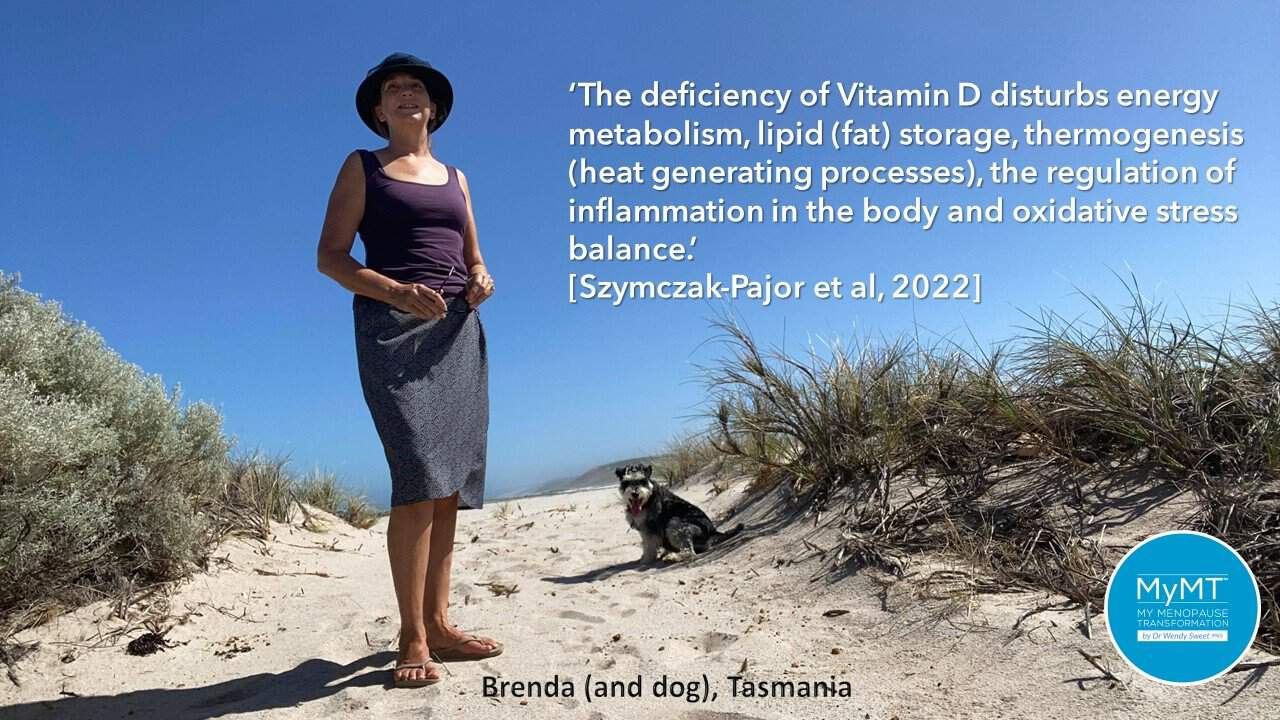
5. HIGH STRESS LEVELS – Some stress is good for us, but the problem in our menopause transition is that too much stress (and this includes from not sleeping and/ or too much exercise) increases cortisol levels. This powerful hormone works in conjunction with melatonin.
Too much stress (emotionally and physically) interferes with sleep, liver health and gut health. All of these factors combined contribute to insulin levels staying high and women resist overnight fat-burning. It’s a vicious cycle as so many women find.
- Not sleeping
- Changing liver and gut health
- Loss of elasticity in our blood vessels
- Muscle loss
- Sore joints and
- Stress from our busy lives
All of these factors interact to create the ‘perfect storm’ for weight gain during the menopause transition.
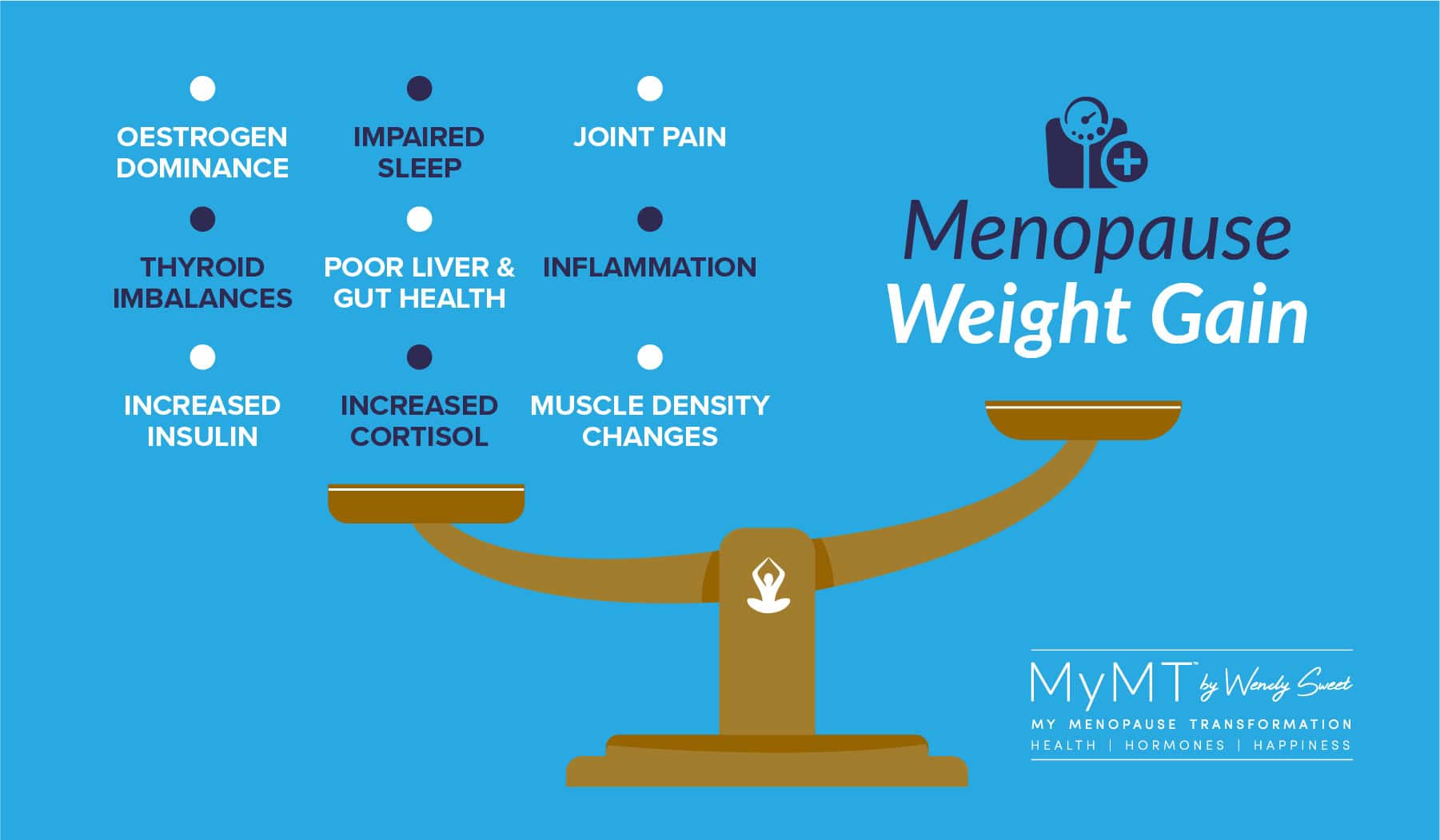
Is the MyMT™ Menopause Weight Loss Coach for you? I hope so!
To achieve sustainable and positive health behaviours and outcomes, evidence suggests that for those people who desire these changes (in this case, midlife female clients), support in behaviour change techniques that promote self-efficacy, self-determination and self-responsibility, are an important determinant for ‘success’. (Robinson & Morrow, 2016)*
But clients also need more than ‘just support’ to change their lifestyle health behaviours. They need Health Coaches and Practitioners who have the knowledge, understanding and empathy specific to the stage of life that they are in – their menopause transition.
It is my passion to help you understand the science behind menopause weight gain, which allows us as Practitioners to coach from an evidence based framework.
Everything you need to know is in the MyMT™ Menopause Weight Loss Coach Level 1 Course. I hope you can join me when you are ready.
Wendy Sweet, PhD/ Women’s Healthy Ageing Researcher & MyMT Creator & Coach/ Member: Australasian Society of Lifestyle Medicine/ NZ REPS Registered Exercise Specialist

References:
- Edwards, B. & Jin Li, [2013]. Endocrinology of menopause. Periodontology, 61, 177–194.
- Egger G, Dixon J. Beyond obesity and lifestyle: a review of 21st century chronic disease determinants. Biomed Res Int. 2014;2014:731685.
- Ford, C. et al. [2017]. Evaluation of diet pattern and weight gain in postmenopausal women enrolled in the Women’s Health Initiative Observational Study. British Journal of Nutrition, 117, 1189–1197.
- Frasca D, Blomberg BB, Paganelli R. [2017]. Aging, Obesity, and Inflammatory Age-Related Diseases. Front Immunol. 2017 Dec 7;8:1745.
- Harvard Health, [2018]. Lose weight and keep it off. Harvard Health Online Publications. Boston: MA
- Kendall, B. & Ester, R. [2002]. Exercise-induced muscle damage and the potential protective role of estrogen. Sports Med., 32 (2), 103-123
- Lerchbaum, E. [2014]. Vitamin D and Menopause: A review. Maturitas, 79, 3-7.
- Lombardo M, Perrone MA, Guseva E, et al. Losing Weight after Menopause with Minimal Aerobic Training and Mediterranean Diet. Nutrients. 2020;12(8):E2471. Published 2020 Aug 17. doi:10.3390/nu12082471
- Moudi, A. et.al [2018]. The relationship between health-promoting lifestyle and sleep quality in menopausal women. Biomedicine, 8(2), 34-40.
- Rizzi, M. [2016]. Sleep disorders in fibromyalgia syndrome. J. of Pain & Relief, 5:2.
- Ryan, M. Itsiopoulos, C. et al. (2014). The Mediterranean diet improves hepatic steatosis and insulin sensitivity in individuals with non-alcoholic fatty liver disease. Journal of Hepatology, 59(1), 138-143.
- Santosa, S. & Jensen, M. (2013). Adipocyte fatty acid storage factors enhance subcutaneous fat storage in postmenopausal women. Diabetes, 62,3, 775-782, ProQuest Central.
- Szymczak-Pajor I, Miazek K, Selmi A, Balcerczyk A, Śliwińska A. The Action of Vitamin D in Adipose Tissue: Is There the Link between Vitamin D Deficiency and Adipose Tissue-Related Metabolic Disorders? Int J Mol Sci. 2022 Jan 16;23(2):956. doi: 10.3390/ijms23020956.
- Theorell-Haglow, J., Berne, C. et al (2010). Associations Between Short Sleep Duration and Central Obesity in Women. Sleep, 33(5), 593 – 598
